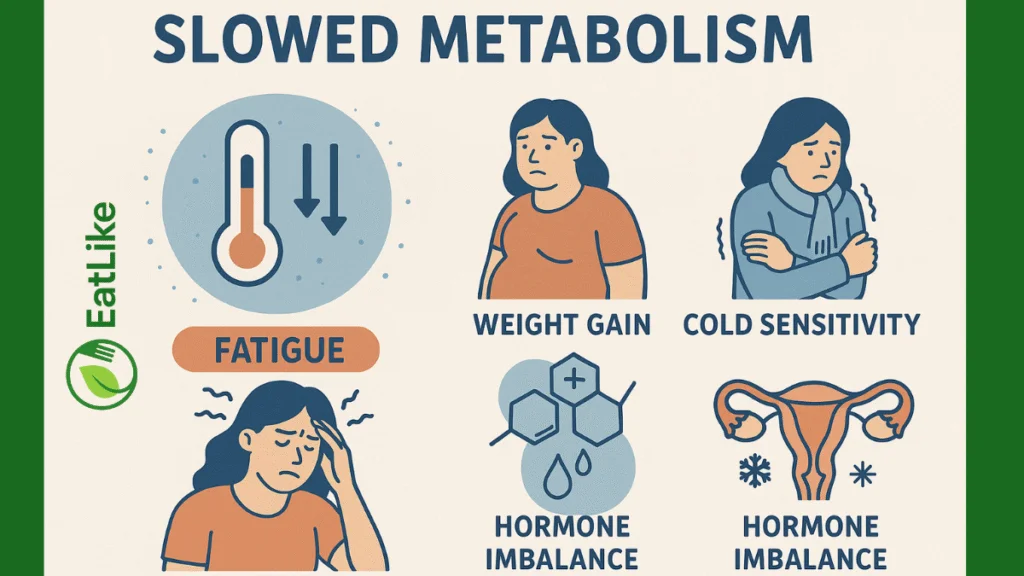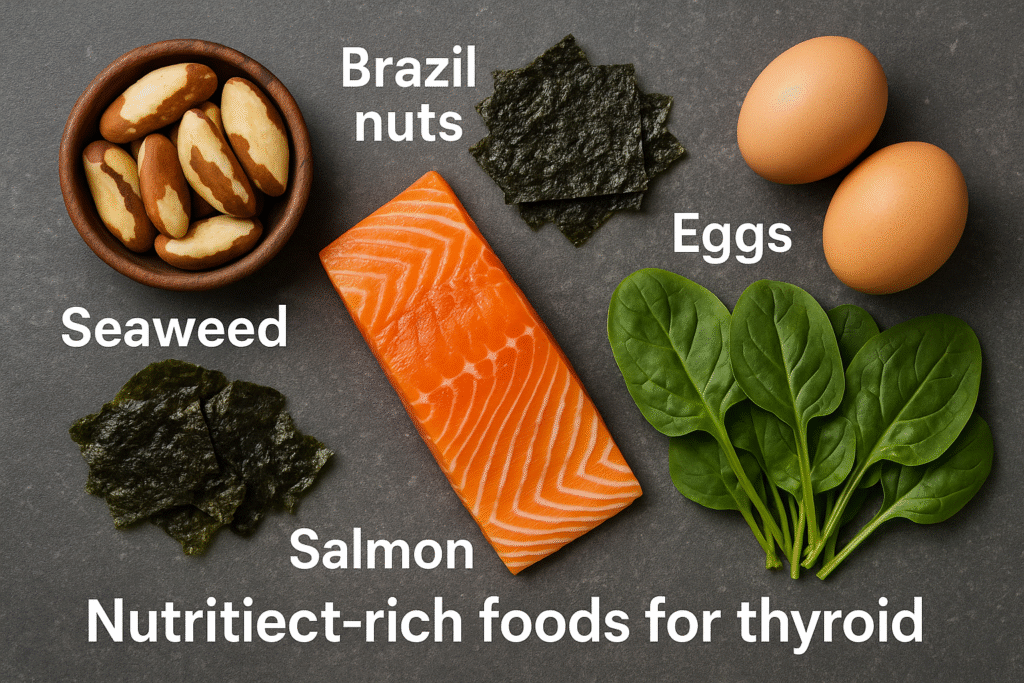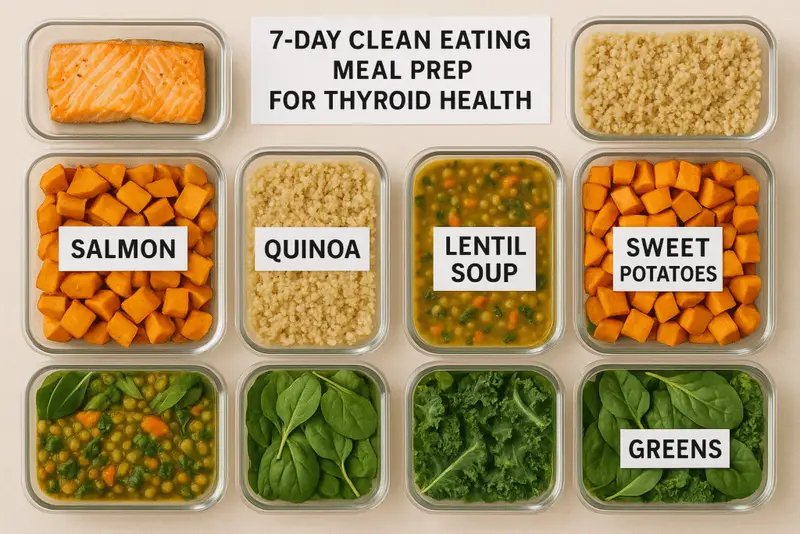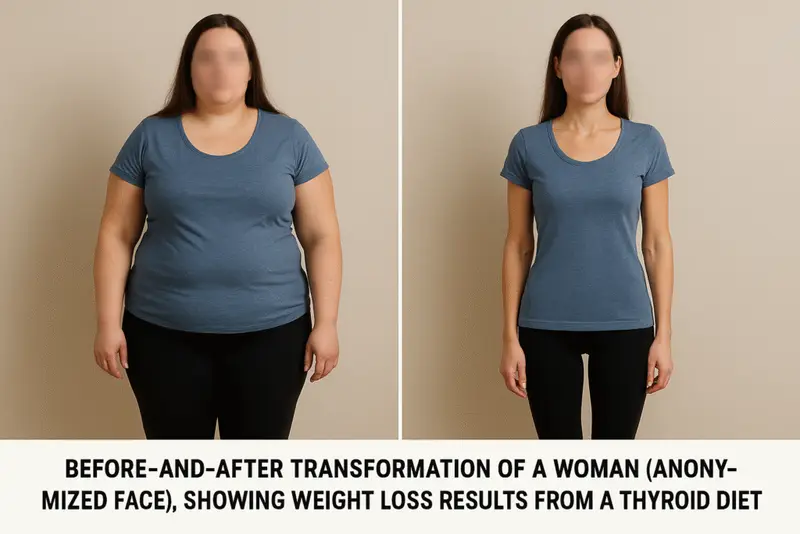What Is Hypothyroidism and Why Does It Cause Weight Gain?
Hypothyroidism, additionally called an underactive thyroid, is a condition in which your thyroid gland doesn’t produce sufficient thyroid hormones. These hormones play a critical role in regulating metabolism, electrical impulses, and bodily functions. While your thyroid slows down, your whole system does too, including how successfully you burn calories. That’s why many human beings with hypothyroidism struggle with unexplained weight gain, sluggishness, and stubborn fat that gains no matter how much they exercise or restrict calories.
The hormone imbalance also influences how your body processes carbohydrates and fat, frequently leading to leptin resistance, low energy, and water retention—all of which make weight loss feel like an uphill struggle.
Table of Contents
Why targeted meal planning matters for thyroid and metabolism
When your thyroid isn’t working optimally, a fashionable diet regimen won’t reduce it. A customized, thyroid-supportive eating regimen can assist in restoring balance by means of fueling your body with the right nutrients, like selenium, iodine, zinc, and omega-3s, that immediately help thyroid function and reduce inflammation. In contrast to fad diets or extreme calorie slicing, a well-designed meal plan supports metabolism, stabilizes blood sugar, and reduces stress for your endocrine system.
Ingredients rich in antioxidants, healthful fats, and lean proteins assist in stimulating T3 and T4 hormone production, reducing fatigue, and increasing energy naturally, supporting your body to heal and narrow down concurrently.
How This 14-Day Plan Isn’t Like Traditional Weight Reduction Diets
Most weight loss plans focus merely on energy in vs. energy out. This plan is distinctive. It’s designed specifically for human beings with hypothyroidism, addressing the foundational reasons for weight retention, not just signs and symptoms. It prioritizes:
- Nutrient density over calorie restriction
- substances to assuage thyroid flare-ups
- Blood sugar balance to reduce cravings and crashes
- Mild detox techniques that support liver and hormone fitness
It’s greater than a diet—it’s a recovery roadmap. You won’t simply shed pounds; you’ll benefit from energy, mental clarity, and hormonal concord.
Who must comply with this plan?
This 14-day hypothyroidism meal plan is right for:
- Women and men identified with hypothyroidism or Hashimoto’s.
- people experiencing unexplained weight gain, fatigue, or brain fog
- Everybody seeking to guide thyroid fitness via a weight-reduction plan
Medical Disclaimer: This plan is intended for informational purposes only and does not replace expert medical advice. Please consult your physician or a registered dietitian earlier than starting any new nutritional regimen, especially in case you are on thyroid treatment or have underlying health conditions.
Want to discover other clever fat-burning techniques? Don’t pass over our popular post on the coffee technique for weight loss, which pairs flawlessly with this meal plan!
Know-How Hypothyroidism & Metabolism

What causes hypothyroidism?
Hypothyroidism, or an underactive thyroid, may be brought about by several underlying elements, a lot of which might be related to the immune system or nutrient imbalances. The most common reasons include
- Autoimmune problems: The leading cause of hypothyroidism is Hashimoto’s thyroiditis, an autoimmune condition wherein your immune system mistakenly attacks the thyroid gland, lowering its ability to provide hormones.
- Iodine deficiency: Your thyroid needs iodine to make T3 and T4 hormones. A lack of this critical nutrient, specifically in regions with low iodine within the soil, can cause sluggish thyroid function.
- Thyroid surgical operation or radiation therapy: folks who’ve gone through treatments for thyroid cancer or hyperthyroidism may also experience permanent thyroid slowdown.
- Positive medications: Lithium, amiodarone, and some psychiatric pills can interfere with thyroid function.
These reasons disrupt thyroid hormone manufacturing, resulting in signs like weight gain, fatigue, and a drop in intellectual performance. Spotting the basic purpose is crucial earlier than attempting any nutritional or lifestyle modifications.
How Hypothyroidism Impacts Your Metabolism
Your thyroid acts as the metabolic engine of your body. When it slows down, so does the whole thing else—mainly the way you burn energy.
Here’s how it affects metabolism:
- Slower Calorie Burn: With decreased thyroid hormone levels, your body’s capability to transform food into energy drops. This results in metabolism slowdown, weight gain, and difficulty losing pounds, even while you’re ingesting less.
- Hormonal Imbalances: Thyroid hormones modify other hormones like estrogen, cortisol, and insulin. An imbalance can cause mood swings, PMS, bloating, and fat storage, especially around the belly.
- Persistent fatigue, one of the hallmark symptoms of hypothyroidism, is regular tiredness. This low energy state not only influences motivation but also reduces physical activity, further slowing calorie burn.
These modifications regularly cause people to experience being trapped in a cycle of fatigue, frustration, and failed diets.
The Leptin and Insulin Connection
Weight gain in hypothyroidism isn’t just sluggish metabolism—it’s additionally driven with the aid of leptin resistance and insulin dysregulation.
- Leptin Resistance: Leptin is a hormone that tells your brain you are complete and allows for modification of fat burning. In hypothyroidism, leptin levels may be abnormally excessive, but the mind will become immune to it. This indicates your frame holds onto fats in place of burning them, making weight loss extraordinarily hard.
- Insulin Sensitivity Issues: An underactive thyroid can cause insulin resistance, especially when mixed with a bad diet and occasional stress triggers. This makes your frame save more glucose as fats and will increase cravings for sugary or excessive-carb ingredients.
Each hormone is tightly connected to your thyroid characteristics and is a predominant player in why conventional low-calorie diets regularly fail for humans with hypothyroidism.
Ingredients That Help Thyroid Fitness

The proper meals can significantly improve thyroid function, lessen infection, and help metabolic fitness, especially for people with hypothyroidism. A nutrient-dense, weight loss plan plays an important role in restoring hormone balance and dealing with weight evidently.
Pleasant meals for hypothyroidism
Sure, ingredients are rich in the critical nutrients your thyroid wishes to provide hormones and characteristics correctly. Here are the pinnacle picks of accessories to include in your everyday food regimen:
Foods to Eat | Nutrients | Benefits |
Brazil Nuts | Selenium | Supports thyroid enzyme activity and reduces inflammation |
Seaweed | Iodine | Boosts T3 and T4 hormone production naturally |
Salmon | Omega-3 fatty acids | Fights inflammation and supports hormonal health |
Eggs | Vitamin D, Iodine, Selenium | Provides essential building blocks for thyroid hormones |
Pumpkin Seeds | Zinc | Helps regulate TSH and overall thyroid function |
Those foods are particularly useful in balancing thyroid hormones, helping metabolism, and combating common hypothyroid signs like fatigue, cold intolerance, and weight gain.
Pro Tip: Attempt incorporating selenium-rich ingredients like Brazil nuts just 2–3 times per week, as too much selenium may be harmful.
Foods to Avoid with Hypothyroidism
Even as some meals assist, others could make symptoms worse or interfere with thyroid medication absorption. Human beings with hypothyroidism ought to limit or avoid the following:
- Cruciferous vegetables (in excess): Broccoli, kale, and cabbage can interfere with iodine absorption when eaten uncooked in large amounts. Light steaming can lessen this effect.
- Gluten: Many individuals with autoimmune thyroid conditions like Hashimoto’s may additionally have gluten sensitivity. Gluten can inflame the gut and cause immune responses.
- Soy merchandise: Soy can disrupt thyroid hormone absorption and may act as a goitrogen, specifically in unfermented products like soy milk or tofu.
- Processed Sugar: Brought sugars spike insulin levels and contribute to infection, weight gain, and hormonal imbalances.
Avoid consuming high-fiber or calcium-rich meals within 3–4 hours of taking thyroid medication, as they’ll block absorption.
Those dietary adjustments are critical for decreasing inflammation, optimizing nutrient uptake, and helping long-term thyroid health.
14-Day Hypothyroidism Meal Plan for Weight Loss
This plan is crafted to guide your thyroid, stabilize strength, and burn fat clearly.
Whether you’re coping with Hashimoto’s, iodine deficiency, or popular fatigue from an underactive thyroid, what you consume matters. This 14-day meal plan is constructed around balanced macronutrients, low-glycemic foods, and substances to nourish your body and lightly reboot your metabolism.
Every meal is designed to:
- Sell thyroid hormone manufacturing.
- Keep away from insulin spikes and electricity crashes.
- Lessens irritation and water retention.
- Keep your metabolism supported and consistent.
You won’t discover excessive fasting or calorie slicing right here—simply clever, thyroid-pleasant consuming.
Center Concepts of the Meal Plan
Balanced Macronutrients
Each day consists of healthful fats (like avocado or olive oil), lean protein (like salmon, eggs, or turkey), and slowly digesting carbohydrates (like quinoa or sweet potatoes). These assist stability, blood sugar, and support thyroid hormone conversion.
Anti-Inflammatory Meals
Continuous irritation is a primary contributor to hypothyroid symptoms. This plan consists of omega-3s, leafy greens, turmeric, and gut-recovery foods like bone broth to maintain health; take a look at it.
Low Glycemic Index selection
With the aid of avoiding blood sugar spikes, low-GI meals reduce cravings and aid leptin sensitivity. Foods like berries, oats, and non-starchy vegetables dominate the menu.
Meal Timing and Add-on Consistency
Consuming at steady times helps your circadian rhythm and hormone regulation. The plan consists of three essential foods and one optional snack day by day to keep away from overeating and fatigue.
Week 1 Meal Plan (Day 1–7)
This first week makes a specialty of rebalancing your thyroid, restoring strength, and kick-starting fat loss, evidently. The meals include iodine-rich ingredients, components, and balanced macros to assist in lessening fatigue and bloating, whilst lightly supporting thyroid hormone production.

Day 1–7 sample Meal table
Meal | What to Eat | Key Nutrients |
Breakfast | Greek yogurt + chia seeds + blueberries | Protein, Omega-3s, Fiber |
Lunch | Grilled salmon + quinoa + steamed spinach | Omega-3s, Iodine, and Iron |
Dinner | Baked chicken breast + roasted sweet potatoes + broccoli | Zinc, Selenium, Vitamin A |
Rotate proteins like turkey, eggs, or sardines to preserve the week’s flavorful and nutrient-rich meals.
Quick Prep Hints (Time-Saving Thoughts)
- Batch-prepare dinner quinoa and sweet potatoes on Day 1 to reuse all week.
- Grill or bake proteins (like fowl and salmon) earlier, then store in airtight containers for smooth lunches and dinners.
- Use frozen natural spinach or broccoli to shop, reducing washing time.
- Make chia seed pudding overnight for a fast, thyroid-pleasant breakfast alternative.
Week 1 Grocery Listing (Clever & Easy)
Right here’s a foundational listing that will help you stay on track:
Proteins
- Salmon fillets (wild-caught, if possible)
- natural bird breasts
- Greek yogurt (plain, full-fat)
- Eggs (omega-3 enriched)
Vegetables & Veggies
- Spinach
- Broccoli
- sweet potatoes
- Avocados
Culmination & Seeds
- Blueberries (fresh or frozen)
- Chia seeds
- Lemons (for detox water)
Complete Grains & Extras
- Quinoa
- Olive oil (bloodless-pressed)
- Seaweed snacks (iodine improves)
- Bone broth (top-notch for intestinal health)
Tip: Persist with entire, organic, and minimally processed objects for maximum thyroid support.
Week 2 Meal Plan (Days 8–14)
Week 2 builds on the inspiration laid in Week 1—adding variety, deeper gut help, and more plant-based thyroid boosters. This section continues to emphasize foods, lean proteins, and occasional glycemic carbs while adding greater variety to prevent nutrient fatigue and keep you prompted.
Day 8–14 pattern meal table
Meal | What to Eat | Key Nutrients |
Breakfast | Oats + flaxseed + unsweetened almond milk | Fiber, Omega-3s, Plant Protein |
Lunch | Lentil soup + mixed greens salad (olive oil) | Iron, Magnesium, Vitamin K |
Dinner | Shrimp stir-fry + brown rice + rainbow veggies | Iodine, Antioxidants, B Vitamins |
Keep hydrated with warm lemon water in the morning and herbal teas like ashwagandha or ginger; publish meals.
Clever Meal Pointers for Week 2
- Soak oats and lentils in a single day to enhance digestibility and reduce bloating.
- Use iodized sea salt or kelp flakes for your stir-fry for an herbal iodine boost.
- Stir-fry with coconut or avocado oil for thyroid-pleasant fats.
- Prep shrimp or legumes earlier and shop in glass boxes for a smooth right of entry.
Week 2 Grocery Essentials
Plant-Powered Fundamentals
- Rolled oats
- ground flaxseed
- Brown rice
- mixed greens (arugula, spinach, romaine)
- Rainbow veggies (bell peppers, carrots, zucchini)
- Almond milk (unsweetened, calcium-fortified)
Proteins
- Shrimp (clean or frozen, deveined)
- Brown or green lentils
- Bone broth (for soup base)
Functional Add-on
- Apple cider vinegar (for salads)
- Turmeric + black pepper
- Coconut oil or avocado oil (for cooking)
- Ginger & cinnamon (blood sugar manipulation + taste improvement)
Rotate herbs and spices to prevent inflammation and keep your gut microbiome diverse and wholesome.
Everyday Detox & Hydration Suggestions
On the subject of handling hypothyroidism, hydration isn’t non-obligatory — it’s crucial. The right fluid intake helps alter body temperature, helps metabolic function, flushes out pollution, and enhances the absorption of crucial nutrients like iodine and selenium.
Extra importantly, constant hydration aids in natural detox, enhances adrenal support, and relieves common hypothyroid signs and symptoms like fatigue, brain fog, and constipation.
Why Hydration is Fundamental for Thyroid Health
An underactive thyroid can slow down digestion and lymphatic drainage, leading to poisonous buildup and water retention. Drinking enough fluids day by day:
- Helps thyroid hormone transport within the bloodstream
- complements kidney and liver detoxification pathways
- Continue the lymphatic device, shifting to flush toxins.
- Reduces bloating, puffiness, and fatigue
Plus, it helps fight dry skin, another unusual trouble with hypothyroidism.
Intention for eight–10 cups (2–2.5 liters) of smooth, filtered water in keeping with the day. Boom consumption on days when you’re more lively or consuming higher fiber.
Top 3 Detox Beverages for Thyroid & Adrenal Assist

Here are gentle, powerful beverages that work along with your body’s natural cleansing systems:
Detox Drink | Benefits |
Lemon Water (AM) | Alkalizes the body, supports liver function, boosts digestion |
Green Tea (Midday) | Rich in antioxidants (EGCG), promotes fat oxidation, supports thyroid metabolism |
Ginger Water (PM) | Improves circulation, reduces inflammation, and supports adrenal balance |
Those easy add-ons could make a huge impact while paired with a thyroid-pleasant weight loss plan. Pro
Tips for Day-by-Day Detox
- Begin your morning with hot lemon water + a pinch of sea salt for electrolyte stability.
- Upload cucumber or mint to water bottles for flavor and more minerals.
- Drink green tea between meals (no longer with food) to avoid interfering with iron absorption.
- Use ceramic or glass containers to keep away from hormone-disrupting BPA found in plastic bottles.
While dealing with hypothyroidism, excessive workout routines and fad regimens often backfire. Instead, mild, consistent habits help regulate hormones, lower stress, and reignite metabolism appropriately.
Gentle movement ideas
In case your thyroid is slow, severe aerobic exercise can raise cortisol and further slow weight loss. The key is sustainable, low-impact motion that helps joint health and electricity.
Try those hypothyroid-friendly physical activities:
- Yoga: complements flexibility, reduces stress, and stimulates lymphatic flow
- Walking (20–30 mins day by day): Boosts circulation and metabolism without overtaxing the adrenals.
- Resistance band schooling: Preserves lean muscle mass and improves insulin sensitivity.
Those movements set off your metabolism, even as you avoid the adrenal fatigue not unusual in human beings with underactive thyroids.
Sleep, strain, & hormonal stability
Stress and sleep are regularly neglected in weight loss, but they’re essential for thyroid health. Excessive cortisol levels (your frame’s stress hormone) can block the conversion of T4 to energetic T3, the hormone your frame needs to burn calories. Negative sleep disrupts hormone stability, increases ghrelin (a starvation hormone), and reduces leptin (a fullness hormone).
Purpose for seven to nine hours of restorative sleep nightly. Use blue-light blockers and keep your room cool to optimize melatonin production.
FAQs
Can a hypothyroidism weight-reduction plan help me shed pounds?
Yes, a properly balanced, hormone-supportive meal plan rich in foods, healthful fat, and vital vitamins (like selenium and iodine) can help increase metabolism and promote fat loss in people with hypothyroidism.
Are there any dietary supplements I should take?
Constantly seek advice from your healthcare company first.
But common dietary supplements shown to help thyroid health include:
Selenium aids hormone conversion (T4 to T3).
Diet D—supports immunity and hormone stability.
Zinc—critical for thyroid hormone synthesis
Real Consumer Evaluations

Actual humans have followed this 14-Day Hypothyroidism Meal Plan for Weight Loss and seen tangible consequences. Even as individual outcomes range, here’s a photo of true person testimonies (names anonymized for privacy).
Testimonial 1
“After years of slow power and gaining weight despite dieting, this plan eventually gave me readability. The meal plan turned out to be easy and scrumptious, and I dropped 5 kilos in 2 weeks — without feeling deprived.”
— Maria R., 42, recognized with Hashimoto’s
Testimonial 2
“I in no way realized how much gluten and sugar were inflaming my body. The detox liquids and the focus on iodine and selenium changed my mood and sleep within days!”
— James L., 35
Very Last Thoughts: Persist with the technological know-how.
Unlike the latest crash diets, coping with hypothyroidism calls for a long-term, evidence-based method. This plan isn’t always just about losing weight — it is about supporting your thyroid health holistically.
Recheck your lab assessments (TSH, free T3, free T4, reverse T3) every 3–6 months along with your endocrinologist.
Screen signs like fatigue, brain fog, temper swings, and hair loss — they often improve with consistent, thyroid-nourishing vitamins.
Most significantly, recognition of sustainable behavior, real meals, and stress management.
Weight reduction with hypothyroidism is a marathon, not a sprint. However, with the right gear, persistence, and steering, it’s truly viable.

